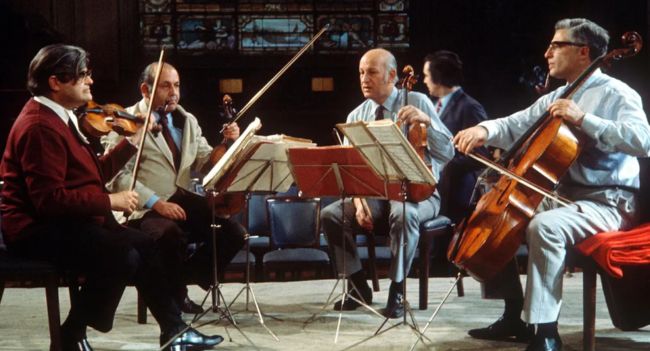Martin Lovett passed away on the 29th of April, 2020. The British cellist, ninety-three years old at his death, was the last surviving member of the Amadeus Quartet, Britain’s premiere chamber ensemble for some forty years, from its founding in 1947. The quartet, humorously nicknamed the “Wolf-gang,” was intimately associated in the public imagination with the music of Viennese quartet masters W. Amadeus Mozart, Haydn, Beethoven, and Schubert, while also working with an ailing Benjamin Britten on the composition of his Third Quartet, which they premiered after his death. In England and the world over, the Amadeus was beloved for its warm, emotionally rich style of music-making.
Undeniably English (its members were even made Officers of the Order of the British Empire) the quartet was also strongly Viennese. Though Lovett was British-born, violist Peter Schidlof and violinists Norbert Brainin and Siegmund Nissel were all young Jews in Vienna when, in 1938, the Austrian Anschluss with Nazi Germany drove them to England as refugees. Upon the outbreak of WWII, all three were interned as “friendly enemy aliens.” Brainin and Schidlof first met at an internment camp, and following Brainin’s release, Schidlof and Nissel met at the same camp. Eventually the three ended up together in London, all studying with Max Rostal, who introduced them to Lovett. Thenceforth, the quartet remained a unit, with no personnel change, until Schidlof’s death in 1987. Then, they disbanded.
The four were a diverse bunch. First violinist Brainin was flamboyant and physically imposing, a “Falstaff of the fiddle” in the words of Amadeus biographer Daniel Snowman. Second violinist Nissel was self-effacing but strong. It was he who famously compared a string quartet to a bottle of wine: the first violinist was the label, the cellist the bottle proper, and the inner voices the contents, where flavor and color lie. Schidlof, nicknamed “Eagle Ears,” was a generous performer and a demanding rehearser. Lovett was nearly as well-known for his wit as for his beautiful playing.
Collectively, they were first called the Brainin Quartet—the first violinist had just won the Carl Flesch Competition—then the “London Vienna Quartet.” The group’s musical approach, as Nissel once described it, had its origins in the kind of schmaltzy, sentimental playing heard in Viennese popular music—only in the Amadeus’ hands, the schmaltz was refined, rehearsed, disciplined. Still, the quartet’s bow-strokes tended to be fuller-toned and more on the string than those of today’s quartets. Any resultant loss of crispness was made up for in subtlety, intimacy, and full-throated expression.
Despite their personal histories, the quartet opted early for an attitude of reconciliation with Germany, at a time when many musicians were boycotting the country. The Amadeus’ 1950 Hamburg debut created a sensation, which Brainin attributed to the performers’ Jewish identities, along with the idea among audience members that here, art could create an opportunity for peace. Not long after, Deutsche Grammophon, eager to present a quartet untainted by Nazi wartime associations, signed the quartet. The relationship proved long and fruitful.
The Amadeus’ favorite composer may have been Haydn. They included his music on most programs, and it’s here that an acquaintance with their essential recordings should begin. One Amadeus gem is the Quinten Quartet: the group brings out all the piece’s inherent drama. But this is not drama of the action-packed variety. Instead, it is drama with tears barely held back. Non-dramatic sections run the gamut from perfect poise to hilarious harmonics. In another D minor quartet, Mozart’s K. 421, the Wolf-gang project a pain that is at once genuine and theatrical, while also demonstrating their mastery of Viennese lilt.
The quartet was less famous for its Brahms, but probably shouldn’t have been. The B-flat Sextet, featuring guests Cecil Aronowitz and William Pleeth, is a wonder, gorgeously expressive while also full of musical sense and drive, and perfectly clear in its voicing. An unexpected twentieth-century treat is the C minor Quartet by Ernest MacMillan. The Canadian composer’s musically conservative score elicits from the Amadeus a big-hearted and rich-toned interpretation. And then there is Britten: the quartet’s historically significant live performance of the dying composer’s Third Quartet respects the work’s death-obsessed austerity while also, in typical Amadeus fashion, keeping emotion barely contained.
